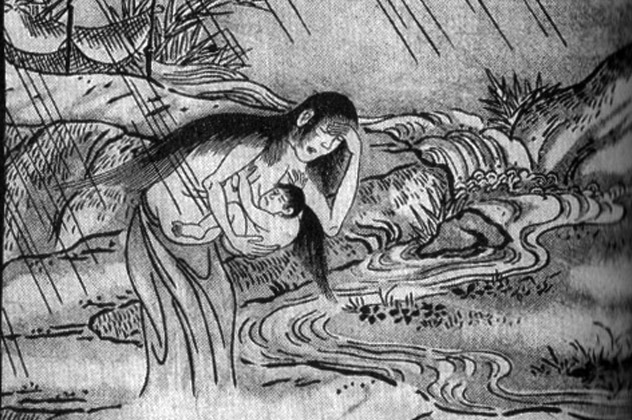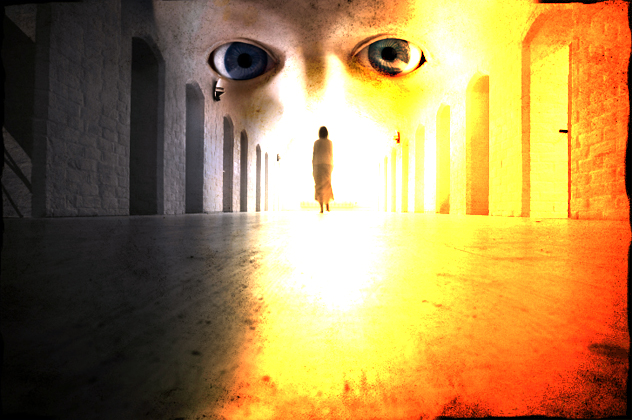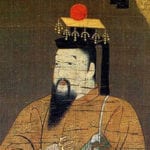 Mysteries
Mysteries  Mysteries
Mysteries  History
History 10 Surprising Stories About the Texas Rangers
 Humans
Humans 10 Philosophers Who Were Driven Mad by Their Own Theories
 Miscellaneous
Miscellaneous 10 Video-Game-Worthy Weapons and Armors from History
 Weird Stuff
Weird Stuff 10 Psychics Who Accurately Predicted Wartime Events
 The Arts
The Arts 10 Pieces of Art Inspired by a Broken Heart
 Health
Health 10 Science Fiction-Sounding New Medical Treatments
 History
History 10 Surprising Facts About the Father of Submarine Warfare
 Space
Space Ten Astonishing New Insights into Alien Worlds
 Weird Stuff
Weird Stuff 10 Bizarre Summer Solstice Rituals Still Practiced Today
 Mysteries
Mysteries Top 10 Haunting Facts About the Ghost Ship MV Alta
 History
History 10 Surprising Stories About the Texas Rangers
 Humans
Humans 10 Philosophers Who Were Driven Mad by Their Own Theories
Who's Behind Listverse?

Jamie Frater
Head Editor
Jamie founded Listverse due to an insatiable desire to share fascinating, obscure, and bizarre facts. He has been a guest speaker on numerous national radio and television stations and is a five time published author.
More About Us Miscellaneous
Miscellaneous 10 Video-Game-Worthy Weapons and Armors from History
 Weird Stuff
Weird Stuff 10 Psychics Who Accurately Predicted Wartime Events
 The Arts
The Arts 10 Pieces of Art Inspired by a Broken Heart
 Health
Health 10 Science Fiction-Sounding New Medical Treatments
 History
History 10 Surprising Facts About the Father of Submarine Warfare
 Space
Space Ten Astonishing New Insights into Alien Worlds
 Weird Stuff
Weird Stuff 10 Bizarre Summer Solstice Rituals Still Practiced Today
10 Crazy Japanese Superstitions
Japanese superstition explained the unexplainable by turning it into living things. It was a rich supernatural world where spirits lurked in every shadow and monsters walked in the footsteps of men.
10Getting Lost At Night

According to folklore, the supernatural was as big a threat to Japanese travelers by night as were wildlife and bandits. Unless you carried a lantern, the only light to show you the way came from the Moon and stars, so it was only natural that many travelers got lost in the dark. Superstition, however, pinned their detour on a monster.
The nurikabe was a yokai—a Japanese monster—shaped like a wall that appeared in the paths of travelers. Usually invisible, it would completely impede a road, forcing them to go around it. Like many yokai, though, the nurikabe was a trickster. Even if someone tried a different path, the wall would elongate or inexplicably get up and move. It was said that anyone who encountered a nurikabe could get lost for days.
The belief that nurikabe could suddenly appear and impede a traveler’s progress was first recorded in Japan, but there is at least one account of it elsewhere. The author of the popular yokai manga GeGeGe no Kitaro has said in one of his yokai encyclopedias that he encountered a nurikabe during his military service in the jungles of Papua New Guinea. Such an encounter, of course, should be taken with a grain of salt. Following in the footsteps of the historical authors of yokai encyclopedias, the author leaves a number of his stories unreferenced and likely invented them himself.
9Mysterious Footsteps From An Empty Room

Large houses in ancient Japan were open affairs with rooms separated by shoji screens. Noise would carry and would often seem to come from strange places. When rustling noises or the sounds of footsteps came from an empty room, superstition had it that a spirit called a zashiki-warashi was inhabiting the house.
Roughly translated as “parlor child,” zashiki-warashi were child-like spirits that lived in empty rooms. They were said to be at most 12 years old and would occasionally appear to the house’s tenants. While the noises they made were mysterious and their sudden appearances would probably have given most families a shock, zashiki-warashi were said to bring good fortune and prosperity to whomever they lived with.
Unfortunately, they also took it away when they left. Zashiki-warashi moved from place to place whenever they saw fit. In one story, a family had two living with them who brought prosperity to their household while they were present. Eventually they left, however, and soon after almost the entire family died when the servants mistakenly served them a meal of poisonous mushrooms. The next family that the two zashiki-warashi moved in with, meanwhile, immediately became prosperous. Due to their association with fortune, it’s been theorized that zashiki-warashi were a device used to explain the sudden rise and fall of wealthy families.
8Missing Children

There could be any number of reasons for the disappearance of a child, but according to ancient Japanese superstition, most missing children were spirited away by a monster called an ubume. An ubume is a bird-like creature that became a woman who kidnapped children once its feathers were plucked. Ubume were believed to be the spirits of women who died in childbirth, though they could also have died while pregnant. Either way, their attachment to their lost child lingered after death and gave them an insatiable need for one of their own, which they appeased by kidnapping one.
Another incarnation of the ubume is a topless woman carrying a baby. Appearing at dusk at crossroads and bridges, the ubume would ask passersby to hold her child while she ran an errand. The baby grew heavier and heavier until the person holding it recited a Buddhist prayer, whereupon the ubume returned and thanked them for bringing her child back into the world of the living. Still other accounts had ubume searching for guardians to care for her baby after her death, while in others she did so herself by making occasional visits into town to buy supplies with coins that turned into dried leaves after she disappeared.
7Missing Lantern Oil

Night work was usually done by oil lamps in ancient Japan. Unfortunately for those who made their living at night, the preferred oil was fish oil, a favorite of both mice and cockroaches. The pests would drink the oil and force the worker to waste time fending them off. Sometimes, though, when the loss of oil was thought to be too much for the critters to have stolen, superstition held that it was taken by a monster called the himamushi-nyudo.
It was said that the soul of a person who wasted all his free time would become a himamushi-nyudo—which roughly means “oil licker”—and interfere with the night work of others. Despite the superstition, the connection to cockroaches was not lost on yokai catalogers, and the monster was often depicted alongside cockroach symbolism. As the insect was once believed to have been born from the cracks in kama, or Japanese scythes, the himamushi-nyudo was often portrayed with cockroaches and other related symbols like mugwort and chickens, which were thought to keep the pest away. This association led to the suggestion of himamushi-nyudo being giant anthropomorphic cockroaches.
6Dirty Ceilings And Night Chills

Without modern heating and insulation, ancient Japanese houses proved very cold in winter. Those with high ceilings also grew quite dark at night. Superstition held that both winter’s chill and the dark were caused by a monster called the tenjo-name. The creature would float in the upper reaches of the room, bringing down the temperature and obscuring the ceiling. It was a tall, bony creature with a long tongue that it used to lick the ceilings. When the tenjo-name licked the ceiling it became dirtier, not cleaner.
Even as a superstition, blaming dirty ceilings, winter chills, and darkness on a monster might sound absurd, and it’s unknown how widely believed this particular tale actually was. Modern historians now think that the author of the historic yokai encyclopedia in which the tenjo-name first appeared most likely simply invented it without any prior belief in its existence.
5The Feeling Of Being Watched

In ancient Japan, taking shelter in an abandoned house might have been necessary for protection against the elements, but just like today it often proved an unnerving experience. It was often reported that people who slept in an abandoned house had an uncanny feeling that they were being watched by an unseen presence. Unwilling to chalk the sensation up to mere imagination, superstition held that uninvited guests were in fact being watched by the house itself. Called a mokumokuren, the old, abandoned house would sprout hundreds of eyes that would watch them ceaselessly.
As unnerving as an over-vigilant animated house sounds, the idea of the mokumokuren was somewhat tongue in cheek. It is believed to be another creation of the same artist who invented the himamushi-nyudo. While the former was rather ugly and frightening, the mokumokuren’s eyes looked more confused than sinister. The artist and cataloger Toriyama Seiken wrote in his description that it came about because the former owner of the house probably played the game of go. Both the squares on the board game and the pieces were known as “eyes” in Japanese, a joke that punned the countless eyes of the mokumokuren. More than 80 of Seiken’s yokai were invented, often to satire unscrupulous monks and ancient Japan’s red-light districts.
4Unexplained Noises From The House

In modern Japanese, yanari means the shaking or rattling of a house, usually during an earthquake. The word itself, though, finds its origins in folklore and superstition. In the past, any strange noise that a house made was caused by a monster called a yanari shaking, hammering, and pounding at the walls. While earthquakes were common in ancient Japan, it wasn’t known that numerous low-level quakes occurred throughout the day that couldn’t be felt. When a house shook for no apparent reason, it was thought to be the yanari causing mischief.
Even modern houses make sounds as they settle into the foundation and the nightly drop in temperature causes their materials to bend, and since ancient Japanese houses were often constructed of bamboo, wood, thatch, and packed dirt, they were likely quite noisy at night. Compounding this was wind and any animal that may have crept in, which would have made the yanari quite the busy little monster.
3Disappearances

According to ancient Japanese folklore, common animals were often more than they seemed. Foxes in particular were responsible for a variety of supernatural mischief. They usually confined themselves to common pranks, but could also be responsible for more sinister exploits ranging from arson to kidnapping. A common belief was that, after nightfall, foxes appeared as beautiful women who lured men away from their families.
One story tells of an amorous man who, while walking around town just after dark, came upon a beautiful young woman. At his insistence, she led him back to her estate and the two spent the night together. The following morning had him vowing eternal love to her and completely forgetting about his previous life. His new wife became pregnant, and nine months later she gave him a son.
Meanwhile, his family had been searching for him for almost two weeks. When they finally gave him up for dead, they prayed to the goddess Kannon to deliver them his body. Kannon answered their prayers and the man suddenly crawled out from beneath the floorboards of their storehouse while the magical family of foxes that had kidnapped him scurried away.
2Falling Down

That someone could simply fall down from time to time didn’t seem to make much sense to the superstitious Japanese, so they held that people were knocked down by a monster. Kamaitachi, or “sickle weasels,” were packs of monstrous weasels that rode the winds and inflicted cuts and scrapes on innocent human victims.
Moving faster than the eye could see, kamaitachi worked in groups of three. The first would knock the victim down, then the second, bearing the sickles, would slash at them until a third came behind and healed the wounds. The monsters were held responsible for all sorts of tumbles, and after getting up and finding a cut, the victim would exclaim they had been cut by a sickle weasel. They were a ready excuse for cuts and scrapes that someone might not be willing to explain. Several accounts had people blaming their wounds on the sickle weasels instead of admitting what they had actually been up to.
1Sleep Paralysis

Compared to other countries, sleep paralysis is common in Japan, with an estimated 40 percent of the population experiencing it at some point in their lives. The prevalence, however, is likely cultural rather than genetic. Called kanashibari, which roughly means “to be bound by metal,” it is considered a well-known phenomena in Japan. With a plethora of blogs and television programs about it, Japanese sleepers are simply more conditioned to recognize kanashibari than those in other parts of the world. Sometimes, though, being unable to move while lying half-awake in bed is believed to be caused by spirits.
Children all the way up to college students describe seeing ghosts or intruders coming into their rooms and pinning them down while they sleep. Children say that sleeping with a stuffed animal draws the binding ghost, as does sleeping on your back. Others say that it’s from being unkind or studying too much. As common as it is, some are fascinated by kanashibari and make a point to use these techniques to attract the horror of being bound by a “spirit.”
Nathan keeps a Japan blog where he writes about the sights and expat life and finds Japanese culture in everyday items. You can also find him on Facebook and Twitter.








